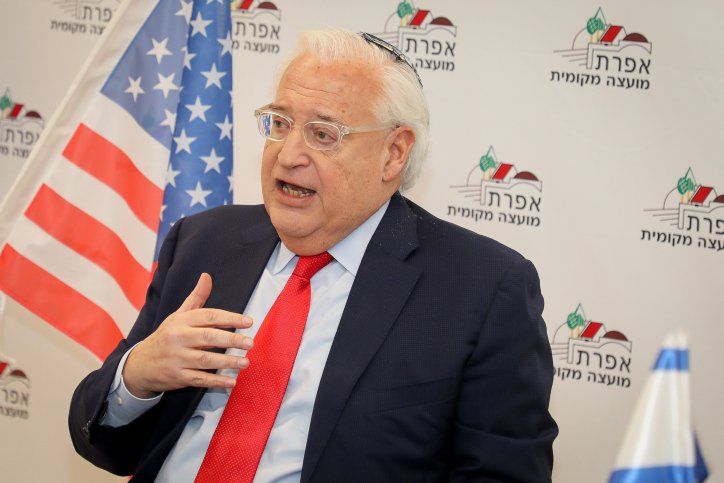“Following the peace agreements with the United Arab Emirates and Bahrain, as regards what is in store for the future, I really think the sky is the limit. I think in time, and I don’t know if it will take a year or a month, but I think that in our lifetime, God willing, we will see an end to the Arab-Israeli conflict as we know it. The idea of 22 Arab League members united in opposition to Israel, refusing to recognize Israel, is coming to an end. It does not mean that all 22 members of the Arab League will join in and right away, it will be gradual, but I have no doubt that it will grow – five, ten countries, maybe more, over time.”
So said U.S. Ambassador to Israel David Friedman at an online event for members of the Friends of Tel Aviv University Association, headed by President Amnon Dick and Attorney Adi Olmert.
On dealing with Iran and its treatment of the Arab states with respect to Israel, Friedman said: “We have withdrawn from the superpowers’ agreement with regard to the Iranian nuclear program, and have even tightened sanctions on Iranian financial institutions. I think they’ve been effectively cut off from the global economy. It is having an effect. It can be seen that the Iranians do not have the resources they once had to carry out their malicious activities in Syria. There is evidence of a degree of retreat, something that was once not thought possible but there is movement in that direction. Hezbollah is weaker than it was a few years ago. We still have work to do in Iraq, and Yemen is still a challenge, but we are doing work there with our partners, including the Israeli government, of course, to maximize pressure on them. Now the Iranians see two things: they see that as they continue on this path, their situation worsens. They are dealing with many challenges internally, but they also see that those who choose a path toward peace with Israel and who strengthen their relationship with America are becoming stronger. I don’t mean militarily, but that forming bilateral relationships with Israel helps countries like the UAE or Bahrain to thrive more, to be safer and to join forces with the greatest power on Earth. So there is both a positive and a negative aspect to this and I think they co-exist. It’s a form of a strategy that complements itself. There are those of us in Washington that see it this way. The Iranians oppose the agreement with the Emirates, Bahrain and others, and if they are so much against it, it must be something that is good both for the world and for the region, and I think it is.”
Of the Palestinian leadership, he said: “The U.S. has given more money per capita to the Palestinian Authority than anyone else. I think overall, since Oslo we have invested a huge amount of money trying to build up Palestinian society and nothing has come of it. The leadership has filled its pockets. Mahmoud Abbas is rich, his friends are rich. The Arab League has nurtured the Palestinians for an entire generation. I think the expectation among all these players was that the Palestinians would eventually condemn terrorism, move towards a realistic peace with Israel, and develop practical solutions. One of the things I discovered in this job is that the Palestinian leadership has repeatedly rejected any economic opportunity for the West Bank because it felt it would hurt their victims’ narrative and therefore preferred to continue down the same path, even if it meant suffering for their people. They have repeatedly turned down offers of real financial assistance. I’m not talking about handouts, I’m talking about investment, real investment, in infrastructure in the West Bank. It’s been on the table for three years, they don’t want it, because for them it would mean normalizing diplomatic relations.”
Friedman added, “Regarding leadership, the question is, who are the leadership? There are two and a half million people living in the West Bank, there are two million living in Gaza. There are two separate leaderships, hostile to each other. Hamas poses a major threat to the Palestinian Authority. If an election were to be held tomorrow, I don’t think any of us would know which side was going to win. Some say Hamas would win the West Bank, and the Palestinian Authority would win Gaza because everyone is so unhappy with its current leadership. The reality is that there is no leadership. There is no one to shake hands with today, to assure that tomorrow we would be able to move forward with an agreement, because no one is capable of representing the Palestinian people because they have prospered from conflict. The Palestinians must stop clinging to their victim narrative. It has served them faithfully for several generations, but I think those times are coming to an end.”
Friedman also said, “Israel is doing a lot to take care of America’s security. There is a tendency to think that America keeps Israel safe, and of course, the U.S. does a lot for Israel in many ways, but in some ways, Israel helps keep America safe because it has perspectives and exposure to certain risks that makes it more knowledgeable than anyone else. So I’m sure that over time as regards America’s foothold here, and I won’t predict because I don’t know now, but whatever happens, if it does decrease, it will be accompanied by an appropriate level of support for, as well as dependence on, Israel.”












